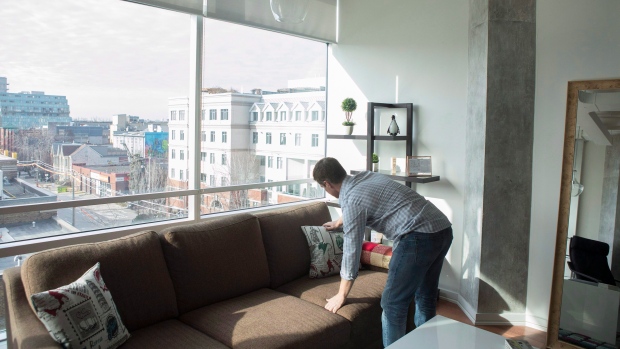TORONTO -- A hearing on the future of Toronto's rules covering short-term rentals like Airbnb is set to wrap up Tuesday.
The hearing at the Local Planning Appeal Tribunal has squared city lawyers against several property owners who appealed the city's recently amended short-term rental bylaw.
The city approved short-term regulations around the start of 2018 but they were appealed and suspended before they could be in place.
The rules include restricting short-term rentals to an owner's principal residence and requiring short-term renters to register with the city and pay a four-per-cent municipal accommodation tax.
While restricting short-term rentals to primary residences, the rules allow an entire home to be rented out when an owner or long-term tenant is away, up to 180 nights per year.
The city has argued the rules are necessary in part to protect rental stock amid a housing crisis, as well as to address issues around noise and other disturbances and to generally bring short-term rentals within city bylaws.
Counsel for homeowners appealing the rules argued that they are too restrictive and limit the ability of short-term rental providers to give choice and cheaper options for visitors as well as newcomers to the city, while also maintaining flexibility for owners.
The tribunal is required to make a decision within 10 months of a notice of commencement, unless it decides more time is necessary. The decision could be appealed.
The hearing covered 32 issues including questions around zoning, justifications for the primary residence restriction, economic impacts of the bylaws, effects on housing supply, as well as potential amendments to the rental bylaws.
A Toronto report found that in April 2017 there were an estimated 20,000 short-term listings over 16 websites, though it noted there were likely duplications. The report said Airbnb alone rented out 988,378 nights in the city in 2016.
Focus on short-term rentals has increased as the market has grown significantly. Statistics Canada found that short-term rental revenue increased by almost 10 times between 2015 and 2018 to $2.8 billion. It found revenue in Ontario from short-term rentals climbed from $94 million in 2015 to $909 million last year.
Vancouver brought in rules last year requiring short-term renters to get a business licence and restricts rentals to a primary residence.










